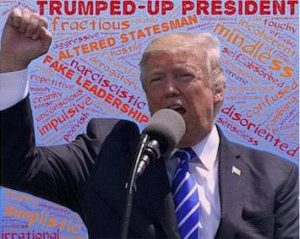Trump’s trade war and the option of ‘fair’ rather than ‘free’ trade – Steven Hail
Instead of leading the world and insisting on trade deals that are fair for all, Donald Trump has chosen to pick an unnecessary neoliberal “free trade” fight – which is likely to have unforeseen negative consequences.

President Trump has started a trade war.
He has done so in defiance of his own political party, the advice of almost all economists and conventional wisdom.
He says he is doing this to protect American jobs.
His opponents point out that by increasing the domestic cost of steel he will be raising costs across manufacturing industries in the U.S. and provoking America’s trading partners into retaliation. This would mean that every job saved in the steel industry – a highly capital intensive industry which will not create many jobs if it expands in any case – might cost several jobs elsewhere in the economy.
Many economists talk with the horror of old-time preachers, denouncing sin of evil distortions to divine principle of free trade. References to recession abound – and it can only be a matter of time before people start to talk of the “beggar-my-neighbour” policies of the 1930s, of a threat to the world order and to America’s position in the world. Even the great oracle known as the stock market has sounded an alarm.
All a bit over the top. And yet, President Trump’s stance is both unnecessary and likely to have economic and political consequences that neither he nor his advisors have envisaged. It is unnecessary because there are far more effective ways of protecting the well-being of American workers, reducing U.S. inequality and giving millions of Americans a better quality of life. There is no need to slap tariffs on imported steel, or cars or other goods to do that.
It is not the trade deficit which is the cause of U.S. inequality and economic insecurity. The U.S. did not and does not need to start a trade war. Don’t get me wrong, I disapprove of recent free trade agreements, with their investor- state dispute settlement mechanisms. I believe all such mechanisms should be scrapped – each and every one of them.
I also believe that countries should be forced to end child labour, ensure basic environmental and ecological protect- ion, guarantee legal minimum wage rates at some ratio of their income per head, ensure worker safety and extend trade union rights to all, as a price of admission into free trade agreements.
But the notion that you need to have a trade surplus, or balanced trade, or at least avoid a trade deficit to achieve full employment is wrong. The idea that a trade deficit “destroys jobs” is wrong.
An appropriate fiscal stance, with a job guarantee to ensure government net spending is at the right level and a high social wage and excellent working conditions within that job guarantee, backed up by a tax system to ensure that neither the command of economic resources nor political power can ever be centralised, is what is needed.
Tax the rich to limit their power and their consumption – not because we need their money. We don’t.
Negotiate trade deals to protect the environment and workers’ rights around the world — not because we need a trade surplus to provide jobs. We don’t.
The free trade deals that are in place at the moment do need to be rewritten.
President Trump is right about that. But they need to be rewritten to guarantee human rights and environmental protection worldwide. They need to be re-written to create a different and more civilised basis for global economic relations in the mid-21st century, than the neoliberal relic of late 20th Century delusions and ideological bias that we have today. They need to be rewritten to allow us to achieve rapidly and fully the 169 targets and 17 sustainable global development goals agreed at the United Nations in 2015.

Let’s list those United Nations goals: Sustainable Development Goals Goal 1. End all poverty everywhere;
Goal 2. End hunger, achieve food security and improved nutrition and promote sustainable agriculture; Goal 3. Ensure healthy lives and promote well-being for all at all ages;
Goal 4. Ensure inclusive and equitable quality education and promote lifelong learning opportunities for all;
Goal 5. Achieve gender equality and empower all women and girls;
Goal 6. Ensure availability and sustainable management of water and sanitation for all;
Goal 7. Ensure access to affordable, reliable, sustainable and modern energy for all;
Goal 8. Promote sustained, inclusive and sustainable economic growth, full and productive employment and decent work for all;
Goal 9. Build resilient infrastructure, promote inclusive and sustainable industrialization and foster innovation;
Goal 10. Reduce inequality within and among countries;
Goal 11. Make cities and human settlements inclusive, safe, resilient and sustainable;
Goal 12. Ensure sustainable consumption and production patterns; Goal 13. Take urgent action to combat climate change and its impacts*;
Goal 14. Conserve and sustainably use the oceans, seas and marine resources for sustainable development;
Goal 15. Protect, restore and promote sustainable use of terrestrial ecosystems, sustainably manage forests, combat desertification, halt and reverse land degradation, halt biodiversity loss;
Goal 16. Promote peaceful and inclusive societies for sustainable development, provide access to justice for all and build effective, accountable and inclusive institutions at all levels;
Goal 17. Strengthen the means of implementation and revitalize the global partnership for sustainable development.
If these goals – which are supposed to be on the agenda for 2030 – are to be met appropriately, every bilateral and free trade agreement in the world needs changing, as does the World Trade Organisation agreement, alongside worldwide national economic priorities and policies.
The American president – whoever he or she happened to be at this point in history – could be leading the world, insisting that all trade deals conform with the sustainable development goals, campaigning to end poverty, maintain ecosystems and build a peaceful world – rather than picking a fight over the U.S. trade deficit.
Instead, this American President has picked a fight for entirely the wrong reasons – which he didn’t need to have – and which is liable to have unforeseen and negative consequences for the very people he claims he is defending: ordinary American workers and their families.
Source: Independent Australia, 5 Mar 2018 https://independentaustralia.net/politics/politics-display/trumps-trade-war-and-the-option-of-fair-rather-than-free-trade,11262
You can read more by Dr Steven Hail at erablogdotcom, and also follow him on Twitter @StevenHailAus, as well as on Facebook at Green Modern Monetary Theory and Practice.



























